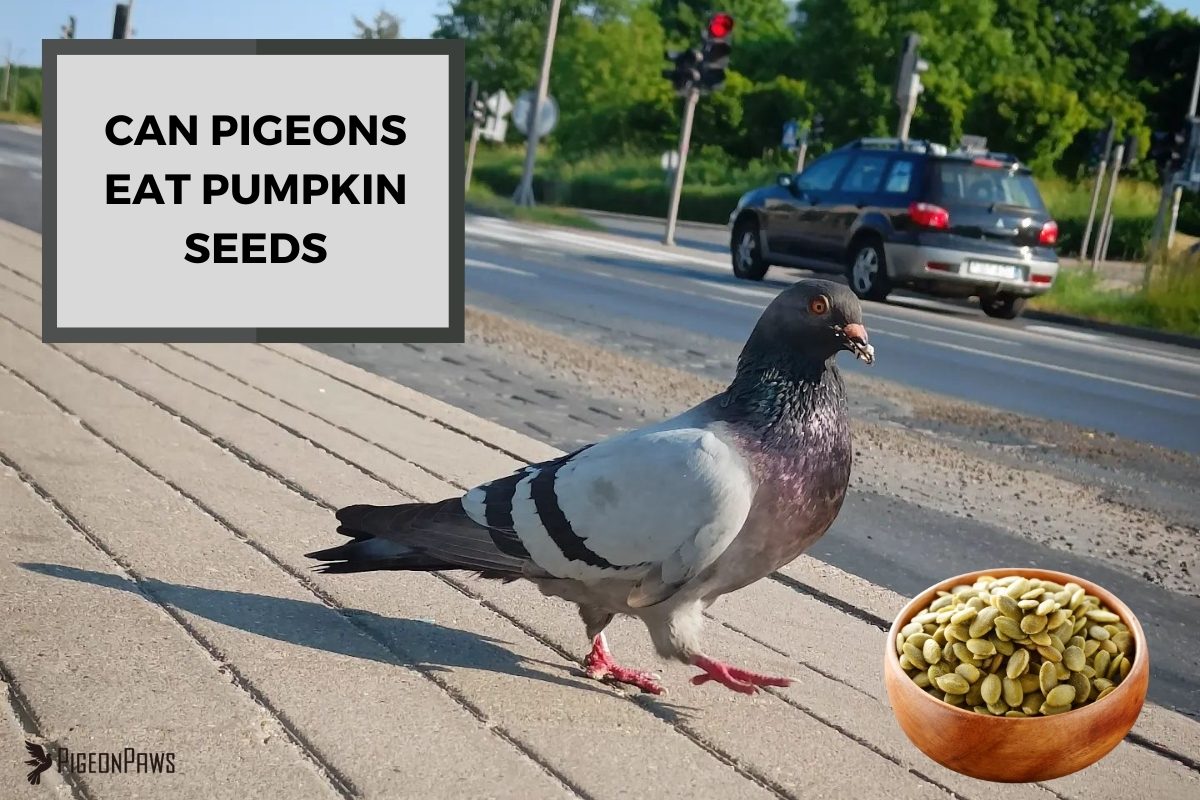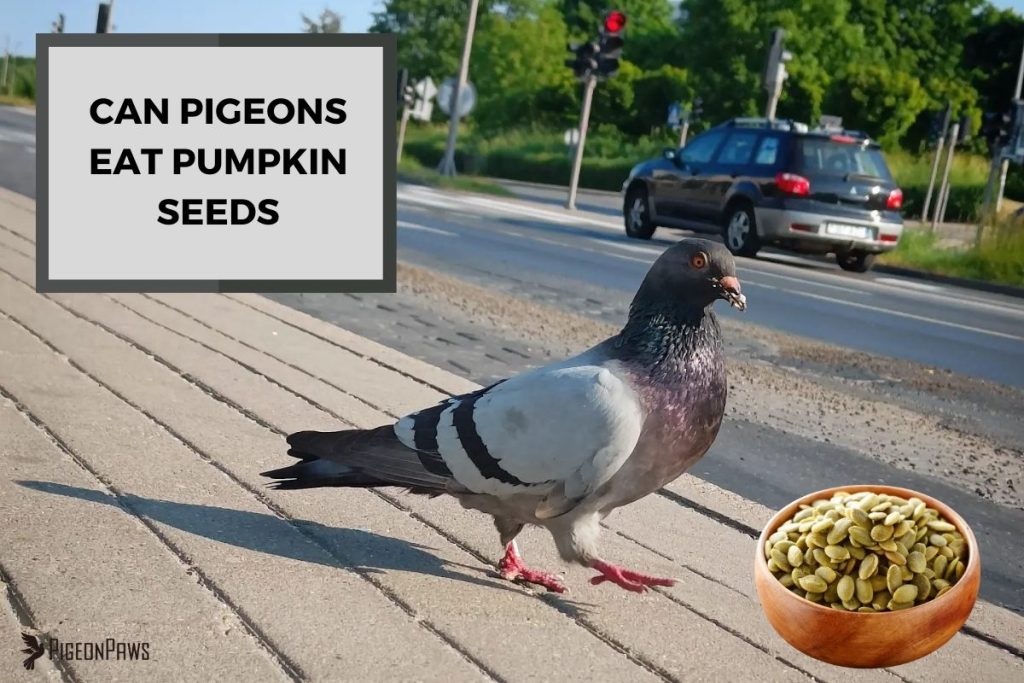Can Pigeons Eat Pumpkin Seeds? What You Need to Know

As a responsible bird owner, you must prioritize the health and well-being of your pet pigeon at all times. It is crucial to constantly seek out new and nutritious food options to add to its diet. Before feeding your pigeon pumpkin seeds, consider the potential risks and benefits to their safety and health while carving a pumpkin.
Pigeons can eat pumpkin seeds which are healthy for them because they have vitamins and minerals in them. But not all pumpkin seeds are okay for them – don’t give them seeds that have been salted, seasoned, or have candy or other flavorings on them.
Here, I’ll explore the benefits of feeding pumpkin seeds to pigeons and any potential risks or drawbacks to consider. So, let’s dive in and learn more about this tasty and nutritious treat for our feathered friends.

Is Pumpkins Seed Safe for Pigeons?
Pigeons are known to have a diverse diet, consisting of various grains, seeds, fruits, and vegetables. Pumpkin seeds are a nutritious food source that can be safely consumed by pigeons.
These seeds are rich in vitamins, minerals, and essential fatty acids that support the bird’s overall health and well-being. But ensure that the pumpkin seeds are not salted or flavored with any artificial additives, as these can be harmful to pigeons.
Also, I advise you to feed pumpkin seeds in moderation, as overfeeding can cause digestive issues. Overall, pumpkin seeds are a healthy and tasty snack that can be included in a pigeon’s diet.
What Are The Nutritional Values Of Pumpkin Seeds?
It is imperative to learn about pumpkin seeds’ nutritional benefits, particularly if you are a dedicated bird enthusiast who recognizes the value of providing your avian companions with a well-balanced diet.
Protein
One of the essential components of a bird’s diet is protein. Pumpkin seeds are a highly commendable protein source, boasting an impressive 5.2 grams of protein per single ounce. It is essential for maintaining and repairing the body’s tissues, making it crucial for birds’ growth ad development.
Fatty Acids
Omega-3 and Omega-6 fatty acids, abundant in pumpkin seeds and essential for maintaining the quality of avian skin and plumage quality, are essential. In addition to regulating the bird’s immune response, these vital nutrients also lower the chance of illness and infections.
Minerals
With a rich supply of vital vitamins and minerals like magnesium, calcium, and zinc, pumpkin seeds have an impressive mineral profile. These minerals are essential for enhancing brain performance and bone integrity, which supports general health and well-being.
Vitamins
Pumpkin seeds contain a wealth of essential vitamins, such as Vitamin E and B-complex vitamins that can substantially fortify the immune system of avian species, promote optimal food digestion, and elevate the overall quality of their skin and plumage.
These essential nutrients play a pivotal role in promoting overall avian health and well-being, making pumpkin seeds a highly recommended dietary supplement for avian enthusiasts seeking to optimize their feathered companions’ vitality and longevity.
How to Feed Pumpkin Seeds To Pigeons?
For those who have decided to introduce pumpkin seeds into their pigeon’s dietary regimen, it is imperative to have a keen understanding of the appropriate feeding methods.
In this regard, I offer the following recommendations to ensure optimal health and nutrition for your feathered companion:
Choose The Right Type of Pumpkin Seeds
When feeding pigeons, it is crucial to be mindful of the type of food offered to them. While many people may think that feeding pigeons any type of seed or bird food is acceptable, it is imperative to utilize unadorned, unsalted pumpkin seeds when feeding these birds. Using roasted or seasoned seeds may include excessive sodium or other seasonings that are inappropriate for pigeon consumption.
Prepare The Seeds
Rinse the seeds thoroughly in cold water and dry them before feeding them to your pigeons. You can also soak the seeds overnight in water to make them easier to digest.
Offer in Moderation
Pumpkin seeds are high in fat and should only be fed to pigeons in moderation. Too many seeds can lead to weight gain and other health problems. Start by offering a small amount and monitor your pigeon’s response.
Mix with Other Foods
By amalgamating these seeds with other avian fare or the freshest produce, a nutritionally sound diet can be achieved for your pigeon. This guarantees the bird’s essential nutrients and minerals intake for optimal health.
Clean Up
It is advisable to ensure that any remaining seeds in your pigeon’s feeding vessel are disposed of to prevent decay and pollution.
Are Watermelons Safe for Pigeons to Eat?
Watermelons make a refreshing treat for us, but can pigeons eat watermelon too? While it’s best to stick to their natural diet, pigeons can indulge in small amounts of this juicy fruit. However, remember to remove the seeds, as they can pose a choking hazard to our feathered friends. Exercise caution and moderation when offering watermelon to pigeons.
Are There Any Risks To Feeding Pigeons Pumpkin Seeds?
Feeding pigeons pumpkin seeds are generally safe and nutritious for them, but there are still some risks that you should be aware of. Here are some essential things to keep in mind:
Overfeeding Can Lead to Obesity
Although pumpkin seeds are rich in nutrients, their high-fat content can harm your pigeons’ health. Overfeeding these birds with an excessive amount of seeds can result in obesity, which may cause many health concerns.
It is advisable for pigeon owners to exercise prudence while introducing pumpkin seeds into the dietary regime of their avian companions in order to guarantee their optimal health and welfare.
Salted or Flavored Seeds Can Be Harmful
Some people like to offer their pigeons salted or flavored pumpkin seeds, but this is not a good idea. These additives are not healthy for birds. Stick to offering your pigeons plain, unsalted pumpkin seeds.
Painted Pumpkins Can Be Toxic
If you are feeding your pigeons pumpkin seeds, ensure the pumpkins have not been painted. The paint itself has the potential to be toxic and can be harmful to birds if ingested.
Watch for Signs of Allergies or Digestive Issues
Although infrequent, it behooves one to be vigilant for indications of gastrointestinal disturbances, such as emesis or diarrhea, and to discontinue the provision of pumpkin seeds in the event of any such complications.
Conclusion
Incorporating pumpkin seeds into the diet of our avian companions is a prudent decision when done judiciously and with adequate preparation.
These seeds present a veritable trove of indispensable nutrients, comprising protein, dietary fiber, advantageous fats, and an extensive array of vitamins and minerals, imbuing them with exceptional value as a nutritious supplement.
It is imperative to ascertain that the seeds are devoid of deleterious additives or impurities and are meticulously cleaned and dried. Furthermore, it is vital to ensure that the seeds serve as a supplementary source of nourishment for the pigeons and not as their primary dietary component.
